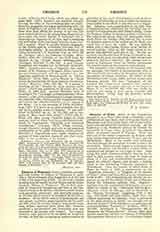

Caesarius of Prum, Abbot of the Benedictine monastery, near Trier, afterwards a Cistercian monk at Heisterbach near Bonn, born of the noble family of Milendonk, and lived in the latter half of the twelfth and in the first half of the thirteenth century. At the beginning of the thirteenth century he entered the monastery of Pram where in 1212 he was elected abbot, to succeed Gerard of Vianden. Pram was then one of the richest monasteries in Europe, with large estates scattered over Germany, France, and the Netherlands. Many of the monks were noblemen who had entered the monastery in order to live a life of comfort. Their example began to undermine the monastic simplicity and discipline, without which no monastery can prosper for any length of time. After ruling five years Caesarius, probably because he desired to lead a more perfect life than he could as abbot of a rich and undisciplined monastery, resigned his abbatial dignity and became a humble monk at the flourishing Cistercian monastery of Heisterbach. Upon the request of Abbot Kuno of Pram he wrote, in 1222, a commentary on the “Registrum Bonorum” or “Register of the Estates of Prum“, which had been drawn up by an unknown monk in 893. This commentary has become an important source for the history of law and civilization during the thirteenth century. The “Register”, together with the commentary of Csarius, was published by Leibniz in his “Collectanea Etymologica” (Hanover, 1717), II, 409 sqq., and by Hontheim in his “Historic Trevirensis” (Augsburg, 1750), I, 661 sqq. The latest and best edition, made from the original manuscript of Csarius, which is preserved in the royal archives at Berlin, was brought out by Heinrich Beyer in “Urkundenbuch zur Geschiehte der mittelrheinischen Territorien” (Coblenz, 1860), I, 142-201. Schonbach in “Sitzungsberichte der k. Akademie der Wissenschaften” (Vienna, 1902) after careful researches ascribes to Csarius of Milendonk the important historical work “De Abbatibus Prumiensibus”, which heretofore was believed to have been written by Csarius of Heisterbach.
MICHAEL OTT

